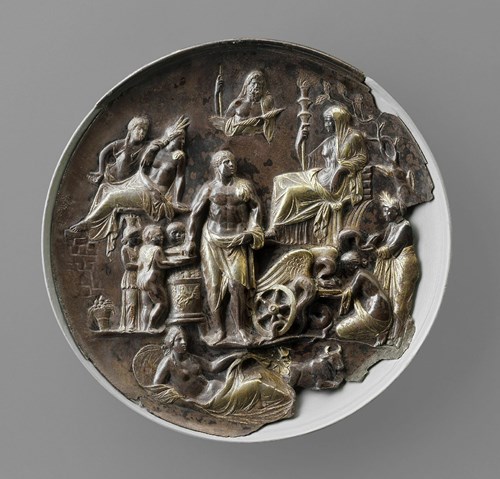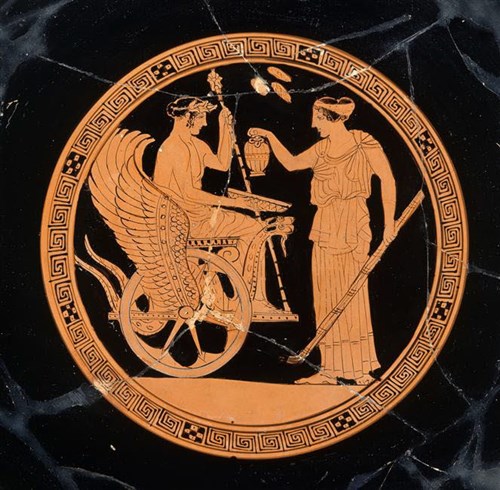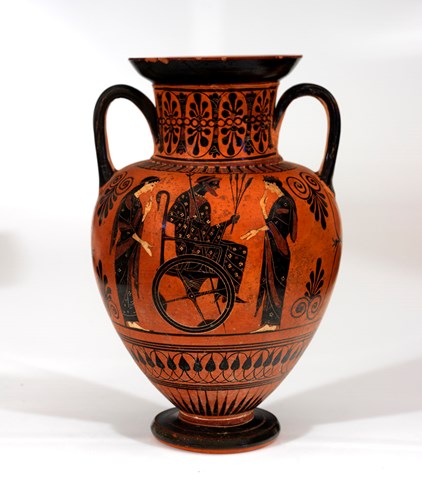Sound-minded Triptolemus is among the most prominent protagonists of the myths associated with the Eleusinian Mysteries. He is also one of the most elusive. His genealogy is ambiguous, with various ancient writers describing him as the son of Celeus (the king of Eleusis) and Metaneira or of Oceanus (the great river which encircled the world) and Gaia (the personification of the Earth). The Homeric Hymn to Demeter, which preserves a treasure-trove of details about the mythical past of Eleusis and the origin of the Eleusinian Mysteries, simply refers to him as a local prince.
There is greater agreement on his contribution to the welfare of humanity. The goddess Demeter came to Eleusis during her wanderings in the aftermath of her daughter’s abduction by Hades. When her identity became known, she instructed the people on the proper performance of her sacred rites. And then she singled out Triptolemus for a special mission of paramount importance. She taught him the secrets about the cultivation of grain and told him to spread the practice of agriculture around the world. The goddess also gave him a chariot drawn by a pair of dragons to facilitate his ambitious travel schedule.

The story of Triptolemus, 2nd half of 1st century BCE, vessel, Kunsthistorisches Museum ©KHM-Museumsverband
Apollodorus claims that Triptolemus was the older brother of Demophon. Demeter attempted to make Demophon immortal by dipping him in flames, but his mother, Metaneira, interrupted the ritual with screams of horror at the sight of her son in the fire. Demeter dropped the child, and Demophon perished in flames. To compensate his family for their loss, the goddess taught Triptolemus the secret of agriculture and gave him a chariot with winged dragons and seeds of wheat to spread the practice of agriculture around the world. Thus, Triptolemus becomes the great Eleusinian hero.

The departure of Triptolemus, The Aberdeen Painter, 470-460 BCE, vessel, Musée du Louvre © 2000 RMN-Grand Palais (musée du Louvre) / Hervé Lewandowski
Drawn through the sky in this magic vehicle, Triptolemus scattered seeds in fallow lands over the whole inhabited world. It was not an easy journey. In Scythia, King Lyncus welcomed him with open arms, but then grew jealous of his ability to provide nutritious food. Lyncus attempted to assassinate Triptolemus while the latter was sound asleep, but Demeter intervened and turned the malevolent king into a lynx. Charnabon, the king of the Getai, wanted to keep the powerful prince forever in his lands and killed one of the dragons. Demeter would have none of this, of course, and promptly supplied Triptolemus with a new dragon. She also placed Charnabon in the sky with a snake entwined around him (the constellation Ophiuchus).

Amphora depicting Triptolemus in chariot between Persephone and Demeter, ca. 550-525 BCE, vessel, Rhode Island School of Design © Rhode Island School of Design
It seems that whenever Triptolemus fell asleep, something terrible happened. In Achaea, Antheas, the son of the local ruler, decided to take the chariot for a ride while the Eleusinian prince rested. Much like Phaethon, Antheas was unable to control the winged dragons and fell to his death. Triptolemus was devastated and collaborated with Eumelus, the father of the dead prince, to find the city of Antheia (in present-day Patras) in his memory.







